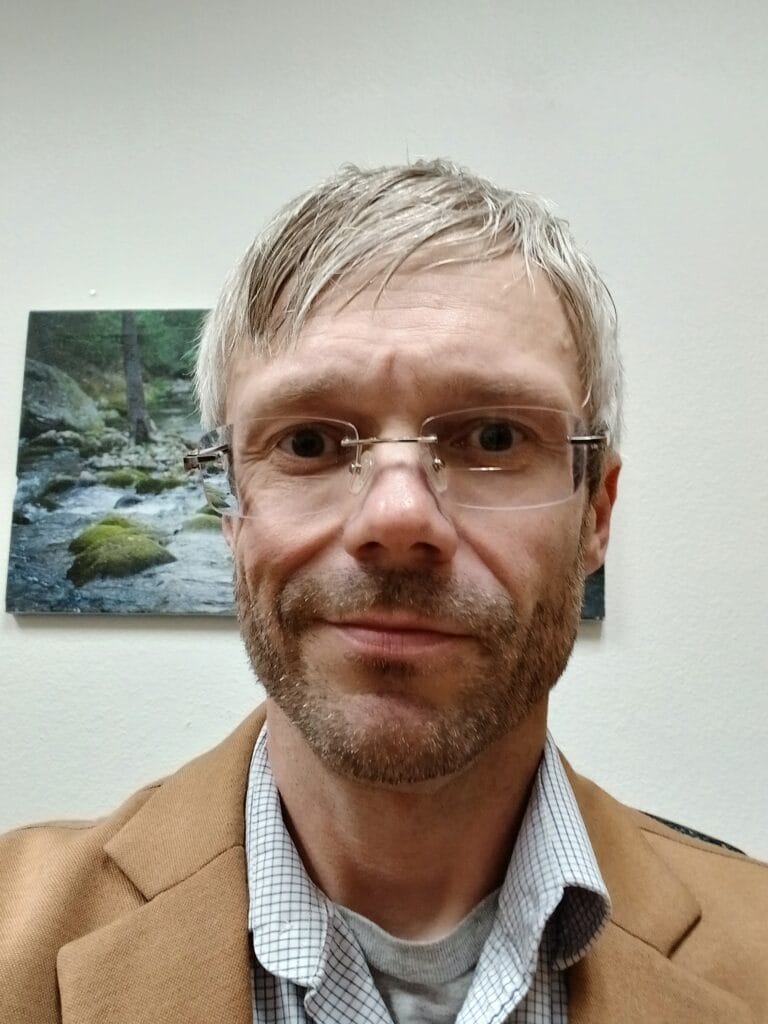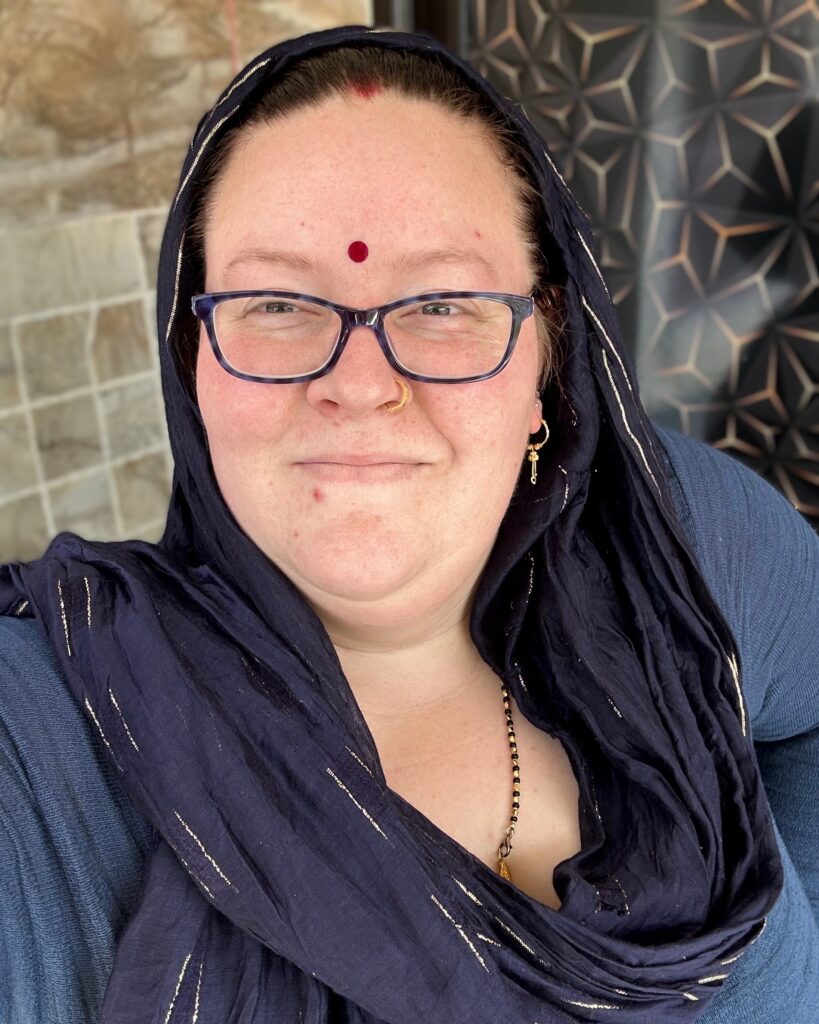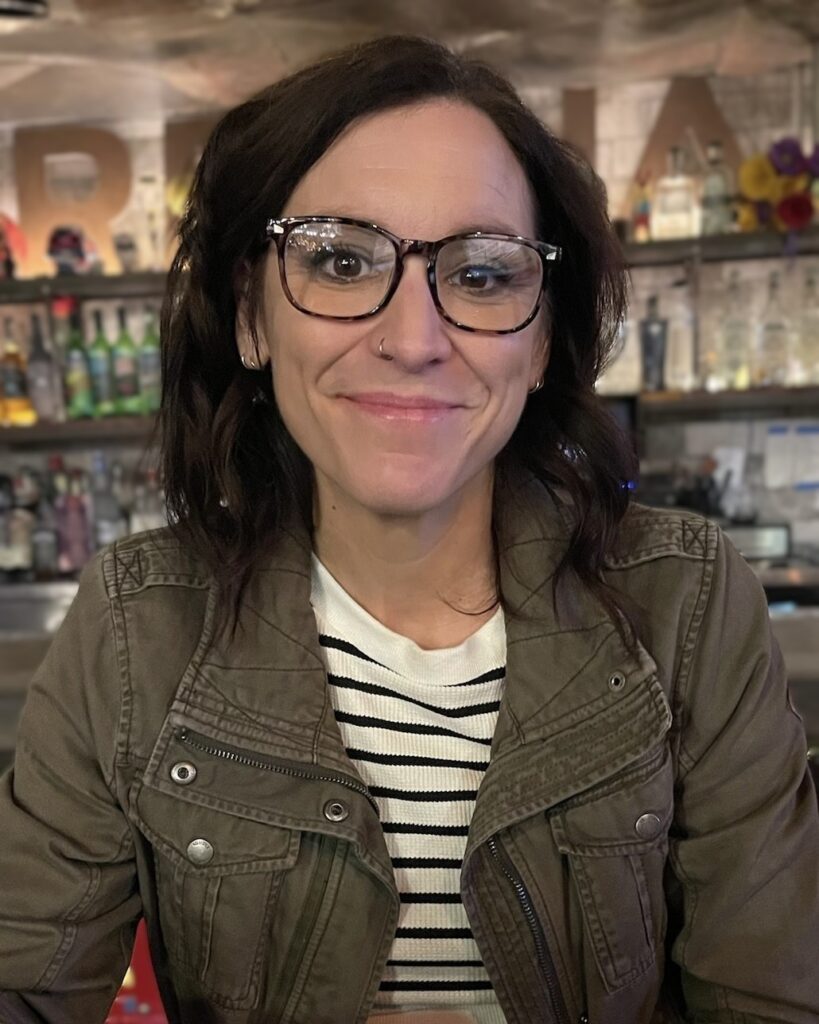Emily Edwards
Quietude
Emily Edwards
Quietude
Eve left her phone in the park on a Tuesday. Everyone thought she was nuts, abandoning her main means of contact. They didn’t understand. Eve didn’t care. She had stopped explaining. What did it matter if she had a phone, she said a hundred times, but eventually stopped arguing with her mother when she felt her face turning blue. In the end, she consented to buying a prepaid phone when her father threatened to have another heart attack.
But she didn’t do it.
Not that it mattered. One of the city’s few working pay phones was on the same block as her apartment building, so she could use that in a pinch. And if she needed to check email, the computer was sleeping in the linen closet where she had shoved it the day after her comprehensive exams. But Natasha was downstairs, and if something was really wrong, her parents would drive over. Eve was usually home. She was reachable.
She was experimenting with quietude. With peace. A mindfulness experiment, she called it. Or that’s what it would be, whenever peace showed up. It had started officially when she accidentally left her phone on a park trail. Eve hiked home, unaware of its absence until she was already inside, in the living room, her right hand empty and cupping air.
It was a strange feeling. Her stomach dropped like a stone thrown from a cliff, like how her body might fall if she jumped into open air. But Eve didn’t jump. She realized the phone was gone and sat down. And continued sitting. She became aware that it was the most comfortable position in the world, and from there, it was easy to ignore the obvious course of action. Suddenly she couldn’t be bothered. She stared at her empty hands. They were suddenly beautiful. She couldn’t stop staring at them, their palm lines telling the fortunes of generations before hers, the stories of whole lives held in their wrinkles. The sun went down. She didn’t go back for the phone.
She liked to imagine a squirrel having picked it up. Carrying it up a tree as a gift for its babies. The babies nesting among it, the phone becoming one of them. Never mind that it was late summer, and Eve didn’t have the first clue about baby squirrels. The fact that she had polluted the forest was helpfully pushed to the back of her mind.
*
Eve considered her experiment to have begun with abandoning the phone. And in some ways, it did. But to take a fuller, and really, more honest view, it had started long before then. Months, in fact. Maybe years, if one cared to paint a Freudian picture of the thing, which Eve didn’t, personally. She’d been inching closer to the edge for months, but for the most part, had succeeded in detaching herself from her mind. What the edge was, she didn’t know, but it was away from the center. Comps—comprehensive exams—were the first break she couldn’t ignore, but she’d been burning for most of her twenties. Slowly, and sometimes just embers, but burning all the same. She wasn’t sure if the implosion, the turning inside-out of herself, would ever happen, and if it already had, where she had been at the time. She’d always described herself as “cripplingly self-aware,” an uncomfortable phrase to utter out loud because it projected images of the muppet Tiny Tim and his little crutch. But lately, she wondered if her analysis was off, if only the least aware people see themselves as self-aware. If one really is self-aware, intimate and comfortable with one’s own consciousness, does it need to be expressed, or can it just be known, as natural as breathing?
A therapist once asked her what she was searching for, and the question had hovered over her ever since, a ghost of annoyance and anxiety, its footsteps echoing incoherently. Eve didn’t stay with that therapist long. She told people it was because her insurance changed, but really, she just stopped going. The therapist unsettled her. They talked a lot about school shootings and her mother. She was the second therapist Eve had gone to. The first always wanted to know what she had eaten that day and talked so much that she left the sessions unsure if she had said anything at all. She wondered sometimes if she should go back to therapy. Third time’s a charm, et cetera. But it would all be performative, an hour-long show every week. Good practice for an acting career she didn’t want, never saying anything real.
On the morning of her oral comprehensive exams, she stayed in bed for a long time. Usually she would wake before dawn, anticipation buzzing inside her like angry wasps. But that morning an unfamiliar feeling washed over her, one that muted everything and drowned the wasps in a sleeping potion. Her body hovered over her, a half-separate entity. She felt outside of herself. Maybe she was outside of herself. Eve looked up at herself and reflected that two Christmases had passed since she got those pajamas. She did not even think of her examination. Only did she get out of bed when the garbage truck approached the alley next to her building.
Eve sat through comps in a dream. She felt and heard herself answering questions, performing the monologues she had spent weeks practicing. Her advisors were a better audience than Natasha, who asked the wrong follow-up questions even after Eve wrote them down for her. She left the graduate building without a pass or fail mark. If she failed, her advising team would email her. If she passed, her head advisor would call her. On her way to the bus stop, she bought herself her third large coffee of the day and sipped it meditatively.
Her advisor called her cell phone at four o’clock that afternoon. But rather than celebrating at a rooftop bar as she had planned, Eve walked over to the park. She didn’t call anyone to share the good news. She let them think there wasn’t any to share. Everything was still muted; colors weren’t aligning as they should. She felt nothing had changed, that tomorrow she would wake up and study the same texts again and again, academic jargon that mattered less and less each time she read it. For some time now she had been wondering what it was all for, what was she working toward, what was the point. The answer came to her next to the flower beds—nothing. Eve walked home in the twilight. The quiet, she whispered to herself. The quiet.
Her advisor left her four voicemails. Her mother left six. She didn’t bother opening her email. Everyone kept calling and calling and texting and calling. Somewhere in the swirl of voices, sometime in the storm, she left her cell phone for the squirrels. And as the days went on, she was less and less certain it was an accident.
*
Some days after severing much of her communication with the world, Eve walked down to the co-op. She wasn’t sure of the day. Wednesday, maybe, or maybe Monday. Her kitchen calendar was from last year; she kept it up for the pictures.
Natasha had said this would happen. She’d lose track of time and then she’d lose her mind. But was that what was happening, Eve mused, or was it serendipity.
The co-op was bright and loud. It wasn’t really the only grocery store within walking distance, but she pretended it was to justify the prices. She wasn’t a member—who could afford to be? People who didn’t cross their fingers when buying a twenty-two dollar bag of coffee beans, she supposed. There were no sale signs on the shelves as she gathered her items: coffee, frozen tilapia, something purple that looked faintly like celery. Real people didn’t need them. They didn’t check their bank accounts daily, didn’t wake up worrying that the money evaporated because it wasn’t really there in the first place. Eve sighed. At times, she wondered if she would ever have the energy or the means to be elaborate, to glitter like something people wanted. If she wanted to be something they wanted. If the gold at the end of the rainbow wasn’t just the fantasy following a freak weather event.
‘Wait,’ the cashier said as she took the receipt. ‘I never do this, but could I get your number?’
Eve looked at them for the first time with an open mouth. No sound came out. Fabulous impression of a goldfish, she heard her mother say. She cleared her throat and blinked several times.
‘I’m sorry,’ she said slowly, ‘I don’t have a phone. That sounds like a lie, but it’s not. I gave it to some squirrels.’ She felt the cashier’s bafflement as she turned on her heel and rushed out the door.
Outside, the bus exhaust greeted her like an unwelcome aunt, and she wondered how many brain cells were lost each time she inhaled the fumes. God, she was tired. The co-op was so many blocks from home. Six, at least. And the flimsy paper grocery bag would probably rip before she got there, even as she begged it strength with each step. How many reusable shopping bags did she have at home? Twelve, as least. Phil, the unwelcome uncle, gifted them every Christmas. Remember when you ran ten miles a day, Eve asked herself, panting as she walked down the flat side lane. Now, what did she have to show for it but less pain in her hips and knees and more cellulite on her thighs. She glanced down at her legs as she walked, trying not to be obvious as her eyes sought the back hemline of her shorts. It’s all genetic, she reminded herself, so many parts of you predetermined. She wondered what chromosome had sprouted to form her brain, its tendrils creeping fast like an ill-mannered plant or some disgruntled forest creature. Eve had a sudden flash of angry gnomes stamping across her fledgling cerebral cortex. What a blessed inheritance.
At last she was home. Home, her haven, the place where the quiet would find her. Eve looked around. Maybe it would arrive a little sooner if she bothered to clean up the place. How many peanut butter cup wrappers were on the table? She counted. Seven. A lucky number, she reasoned, and left them there.
Eve turned on the TV. Animal Planet. The meerkat show. Their little dramas—how she loved them. She watched a few episodes. It was getting near the end of the season, when the matriarch would fall ill and die, and she’d switch over to the show about the college kids in New Jersey, to avoid crying. Eve thought back to that most previous season. The women cast members were interesting. There was something there. Maybe she would write an analysis of it, dig out some of her feminist theory books. Throw in some of the old Marxism for good measure—maybe the cast’s refusal to work in the t-shirt shop was a veiled rebellion against the bourgeoisie. But wasn’t their participation in the show a voluntary assimilation into the modes of production? If such a thing could be voluntary, she supposed, which didn’t seem likely. Stop it, Eve said. Her brain felt half-formed, like clay molded but not yet fired. She liked it better that way, when it wasn’t working. Another project for the quiet, she thought, and did her best to file the idea away, out of sight. She fell asleep on the couch with the TV at half-volume and got up in the night only to open the windows wider. Once, when she opened her eyes, she saw her body floating above her.
*
The days continued, cloudy and humid and grey. Her mother had dropped off a prepaid cell phone some evenings before. Eve looked at it as she walked by on her way to the bathroom and felt surprised that the thin layer of dust she expected on it had not appeared. What, she asked for the umpteenth time, is time, and wondered how much distance the stamping gnomes had covered since she set the cardboard phone box on the table. She felt listless, and dreamy somehow. She thought about going to the park, but the idea alone was sticky. Everything in the world was sticky. The air, the furniture, her eyeballs were sticky. Bathing didn’t help, so why not go to the park? Eve paced back and forth between her bedroom and the front door. But she didn’t leave. Instead, she lit a candle and made a big pot of spaghetti. She ate it in front of the window and watched the stillness of the trees.
*
A day came when she made herself leave the apartment. Depression and complacency are different things, but the line between them is fine. ‘Waiting for the quiet,’ lived in Eve’s mind like a mantra with legs. To outrun it, she walked down the street and got a cold coffee. She circled the block a few times. She watched birds bicker over seed in someone’s yard. Then she ventured back to her building and up one flight to Natasha’s door. A few minutes lapsed before it opened.
‘I was asleep,’ Natasha said, but she didn’t look it. There were no lines on her face.
Eve slipped off her shoes. The air conditioner was off, and inside felt much the same as out. Natasha sipped water from a big plastic bottle.
After they had sat for some time without speaking, a cat came in. Natasha had two cats, one black and one muted calico. She had a dog who died accidentally at a friend’s house the year before. Natasha was so distraught that her mother flew up from Columbia and stayed with her a month.
It was quiet in her living room. Eve closed her eyes.
‘So,’ Natasha said.
Eve opened her eyes. ‘So,’ she repeated.
‘I’ve been thinking about getting a dog.’
‘Really.’
‘Yes.’
‘Are you sure that’s a good idea.’
Natasha paused. ‘Why.’
‘I want to make sure you’ve thought it through.’
‘You know the lease allows pets. Are you saying I can’t afford it.’ She didn’t look at Eve.
‘That isn’t it,’ Eve said. ‘Do you have a timeline?’
Natasha pushed a cat off the sofa. ‘Next week, maybe.’ She looked at Eve. ‘Will you go to the shelter with me?’
Of course she would. ‘Yeah, what day,’ Eve said, looking at the ceiling.
‘I’m not sure.’ Natasha looked away again.
‘Right,’ Eve said. ‘Just text me—or, well, knock on the door.’
Natasha looked back at her. ‘Turn on that stupid track phone.’
Eve stood up and hugged Natasha. ‘I love you, you know.’ She went back upstairs to her own apartment and turned on the shower. She washed her hair.
*
Some mornings Eve got up early. The sun remained hidden. She didn’t mind. She scrubbed—the bathroom and the kitchen and the windowsills, the TV on in the background. Dirt: her worst and ever-present enemy, the one she either banished with fire or let fester for days, depending on her mood. Her mother’s voice again: ‘Until you settle into a routine…’ Routine, Eve mused. Was that what the quiet needed? Would it come if she was regimented, firm, disciplined, all those things she was meant to be?
After a few hours the place was satisfactory, and Eve grew tired of the TV noise. She turned it off and wandered around aimlessly, tracing patterns in the rug with her bare toes. Pathways for the gnomes! she thought and pinched herself hard. She came to the table. There was the track phone. Eve looked at it. She got a glass of water and looked at it some more. She flipped it open and stared at the sleeping screen. Then, her face void of expression, she took the cord from the box and plugged it into the wall. She stuck the cord into the phone. Nothing happened. She pressed a few buttons, put it to her ear, and listened to nothing. The phone didn’t make any noise. It was quiet. Eve went into the kitchen and started to chop vegetables. Soup: her favorite dish even in hot weather. If she went to the shelter with Natasha, maybe she would get a pet fish. Something that eats and gets eaten. Perpetuity.
*
Later, on her living room floor, Natasha brought up the dog again.
Eve tried to take a minute to respond. ‘I don’t see why it has to happen this week.’
‘Because I want it to. I’m ready.’
‘But what if you quit your job?’ She had been threatening to for months, though it would probably never happen.
‘I’ll find another! It’s a dog. Being unemployed with a dog won’t put me out on the street immediately.’
‘And cats.’
‘Yes. I’m aware of all the animals in my household.’
‘It’s just…don’t you think you’re compensating for something?’
‘Such as? Cutting off contact with the world and barely leaving the house?’
‘Don’t start.’
‘I’m just saying, with the utmost love, if you think I’m down in the gutter, you’re there beside me.’
‘Uh-huh.’
They didn’t speak for a few beats. Then Natasha said, ‘Well?’
‘Well, what?’
‘Are you going to set it up?’
‘The track phone?’
Natasha snorted. ‘No, the other thing we’ve been talking about.’
‘Stop.’
‘No.’
‘We aren’t talking about me.’
‘We are until you accept that every decision I make is not some monumental shift in the universe occurring exclusively for you to criticize.’
Eve didn’t say anything.
They sat there and breathed. Eve could hear the construction down the street. She leaned over and rested her head against Natasha’s shoulder.
The other girl broke the silence. ‘I already have a name picked out.’
‘Don’t you think that’s counting your chickens a bit?’
‘How.’
‘For one, you don’t even know what dog you’ll get. What dogs are available. For two, you don’t name an animal until you’ve met them, gotten a glimpse of their personality.’
‘Can you not be so negative?’ Natasha said. ‘Try it sometime.’
Eve sighed. ‘I’m tired.’
‘Have you eaten today?’ Natasha asked like a school nurse, an unnatural mother.
Eve didn’t answer.
‘You should eat something. Low blood sugar, that’s your problem. It impedes the brain.’
Eve still didn’t say anything, and her friend was up, in the kitchen, fetching almonds. She dropped the bag on the floor next to Eve’s head.
‘Here. Do us both a favor.’ Natasha was always munching on something, but Eve realized then that she had never seen her eat a full meal.
Her apartment smelled of scented candles and animal dander, saffron lingering underneath. They had met four years prior when they moved into the building on the same day, and the scent had never changed. Natasha was her best and only friend. Eve spied her computer tossed on the couch, open to a webpage with dog beds too large for her space.
*
Eve left the track phone turned on and resting on the table. The next day began grey and drizzling again, but the smell was new, refreshing and clean and tingling. Natasha did not check her voicemail, so when she left her cell phone for the squirrels, Eve had begun leaving notes on her door. On her way out she passed it. Last night’s tape was there, the note gone. She touched it briefly; there was so much love in that door.
She went to the park and walked around the bowling green. There were a few old men talking on one side of the field. Eve breathed deeply, sucking hordes of gnats into her lungs. She felt lighter, almost invigorated. Her body bounced. Eve skipped along the path, taking bigger and longer bounds until she was gasping and breathless. As she gulped air, she had a vision of the gnomes, a whole colony of them, migrating out of the woods toward her. She wondered if her step patterns could communicate to them. Stop, she told herself emphatically, but she didn’t mean it. Let them come, let them all come, and she would throw a welcoming party.
All the colors before her were bright, unnatural, too bold in the slivers of late afternoon sun. It was not a bad view. Today was right now and right now was today and that was beautiful. Or something close to beautiful. The old men left the bowling green.
Eve felt sure the quiet was coming, and she was going to meet it. She kept walking and walking, and the lightning bugs came out. She counted them until she reached nineteen, when they swam in synchronized loops around the trees. She wondered suddenly if they carried the quiet in them, these insects, and if she spoke to them in their language, would they follow her home? What are the etiquette protocols here, she mused, and stretched out on the grass, her bare legs wet. After a moment she laughed. Softly at first, but then louder and harder until her body shook, and tears streamed down her cheeks. It all made sense somehow, like a terribly simple math problem. She imagined the lightning bugs inside her apartment, their silent bodies lining the walls in reverberant candles, and felt warm.
Eve got up and started home, but stopped walking before she reached the park gates. A cat was standing before her on the path. It was orange, a deep shade, the color of pumpkin left too long in the oven. Human and feline looked at one another, and Eve had a strange, sudden inkling that it had been waiting for her. She was not frightened. Its eyes sparkled intense green in the twilight, two uncanny lightning bugs. The cat sat down on the path and after a moment, Eve knelt beside it on the pavement. She touched its head: the fur was damp and cool with the earlier rain. All at once the cat ducked under her knees, rubbing wet hair on her already wet legs. It purred, and the sound was the most enchanting Eve had ever heard. Something warm lit up inside her. She took another deep breath. It was getting dark. She picked up the cat. He was a boy, and he settled against her chest as if he’d been there a thousand times before. They walked on.
Emily Edwards is a writer in Appalachia. Her poetry has appeared in Bone & Ink, genre2, Voices from the Attic, and elsewhere. Her passions include talkative cats and unscented candles. She can be found on Instagram at @tortoisew0rds. This is her first fiction piece.

Featured in:
Red Rock Review
Issue 52



